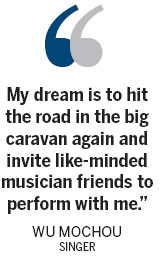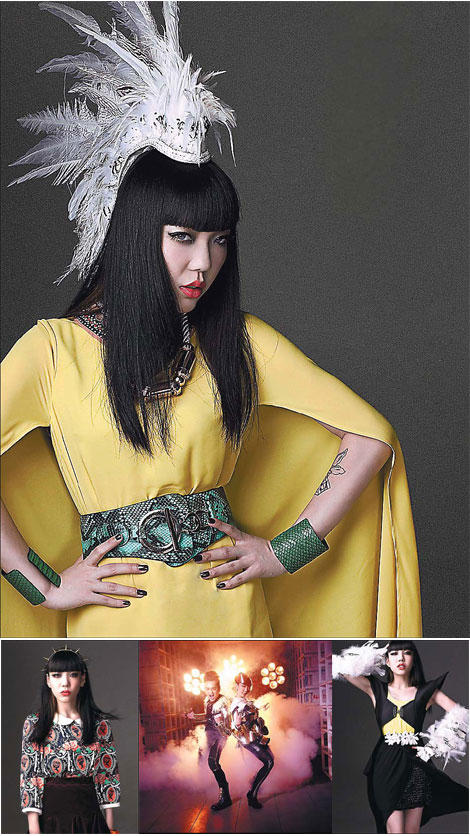Maverick musician
Updated: 2013-02-06 07:49
By Chen Nan (China Daily)
|
||||||||
|
Above center: Wu Mochou sings with Taiwan veteran singer-songwriter Harlem Yu. Top, left and right: Wu wears different costumes with heavy makeup. Photos Provided to China Daily |
Wu Mochou, a 20-year-old singer who rose to fame after participating in The Voice of China, is controversial: You either love or hate her. Chen Nan tells you why.
Some call her China's Lady Gaga and the future of the country's music scene, while others say she is just a flash in the pan. Ever since Wu Mochou appeared on the stage of The Voice of China, the Chinese version of the Dutch TV singing contest, the 20-year-old has fueled controversy with her deviance from the traditional mass appeal looks. Her heavy makeup, unconventional singing style, aggressive attitude and exaggerated facial expressions have raised eyebrows.
There are two extreme opinions: Some audiences have frowned at her image and considered her heavy makeup ugly. There was even a little boy who burst into tears after seeing her photo in subway. But in a recent online vote, she was championed as one of the "50 most beautiful newcomers in the world in 2012".
She sang Jessie J's Price Tag and Lady Gaga's Bad Romance, which won support from Harlem Yu, veteran Taiwan singer-songwriter who was one of the four judges in the contest. Her performances also raised eyebrows and won her fans from across the country.
"Her singing causes goose pimples, which feels great," Yu describes Wu's singing. "Her voice and singing skill are unique."
But Liu Huan, another judge and a famous singer-songwriter, once said that he couldn't understand Wu's performance and interpretation of songs.
The divergent opinions do not seem to disturb Wu, who is a sophomore studying pop singing at Shenyang Conservatory of Music.
"But that's me. I don't want to pretend to be humble or conservative," she says in her signature big voice during an interview.
"When I look at the mirror, I feel beautiful," she adds with a laugh.
She always wears her trademark red lipstick, thick false eyelashes, smoky eye makeup and even front bangs.
In the last seven months since she first performed in The Voice of China, Wu has been exposed to various shows, starred in films and modeled for fashion magazines.
Some consider Wu as the representative of the generation born after 1990 in China because of her individuality.
According to her music teacher Zhang Chuge, Wu is a star in the school because of her singing skills and stage presence.
"Off stage and without makeup, she is ordinary. But when she performs onstage, she becomes another person," Zhang says.
He says Wu's popularity does not come as a surprise. "She has strong personal character, which makes her different," Zhang says.
Indeed, Wu has been harnessing her drama skills since she was a child.
Born and bred in Qiqihar, Northeast China's Heilongjiang province, Wu tagged along when her parents traveled around the country to perform.
Her late father, she describes, was tall and handsome. When night fell, he would put on makeup and turn into a cross-dressing performer.
"I grew up like a gypsy or nomad, which was very exciting. The big caravan was our exclusive stage," she recalls. "I'll never forget those days."
Her mother, who is also a performer, backed up her father with other team members.
She is a cool mother in Wu's eyes.

"My father was bald and I always wanted to be like him, so my mother shaved my head," Wu giggles.
There is a sense of shyness in her when she speaks about her father, who passed away when she was 18.
To remember him, Wu has a portrait of him tattooed on her left arm. The sentimental girl keeps her old mobile phone so that she can still look at all the text messages her father sent to her.
Since young, Wu knew her vocation is to be a performer, just like her parents. She started singing R&B at 9 and likes interpreting different songs in her own way.
She attributes her unique stage presence to her childhood, when she was exposed to a variety of music elements from different places.
Her latest experiment is an improvisation of singer Huang Ling's song, Itch, which she combines with The Wandering Songstress, a song from the 1937 Chinese film Street Angel.
Wu is proud of her work. But some audiences find the remix weird and say she has destroyed the songs.
"I don't think it's strange," she says. "Every song, each lyric, I perform with my own style."
Bai Yu, the owner of a bar in Shenyang, where Wu performed regularly before participating in The Voice of China, says he was bowled over by Wu's voice the first time he heard her.
"She can sing a romantic love song with a wild rock style. At the beginning, I was worried whether her invention could be accepted by the audiences but she conquered them," Bai says.
One of the online articles written about Wu read: "Wu's performance turns traditional Chinese aesthetics upside down She's a rarity in the country and we need people like her."
Wu admits that her greatest challenge now is adjusting from nobody to somebody. She hasn't returned home for a long time and she couldn't go shopping like before.
The young singer hopes her music passion will last for a long time.
"I grew up in the big caravan, which, in my parents' days, represented freedom, passion and courage," says Wu.
"My dream is to hit the road in the big caravan again and invite like-minded musician friends to perform with me."
Contact the writer at chennan@chinadaily.com.cn.
(China Daily 02/06/2013 page18)

 In Photos: 7.0-magnitude quake hits Sichuan
In Photos: 7.0-magnitude quake hits Sichuan
 Li Na on Time cover, makes influential 100 list
Li Na on Time cover, makes influential 100 list
 FBI releases photos of 2 Boston bombings suspects
FBI releases photos of 2 Boston bombings suspects
 World's wackiest hairstyles
World's wackiest hairstyles
 Sandstorms strike Northwest China
Sandstorms strike Northwest China
 Never-seen photos of Madonna on display
Never-seen photos of Madonna on display
 H7N9 outbreak linked to waterfowl migration
H7N9 outbreak linked to waterfowl migration
 Dozens feared dead in Texas plant blast
Dozens feared dead in Texas plant blast
Most Viewed
Editor's Picks

|

|

|

|

|

|
Today's Top News
Live report: 7.0-magnitude quake hits Sichuan, heavy casualties feared
Boston suspect cornered on boat
Cross-talk artist helps to spread the word
'Green' awareness levels drop in Beijing
Palace Museum spruces up
First couple on Time's list of most influential
H7N9 flu transmission studied
Trading channels 'need to broaden'
US Weekly

|

|








